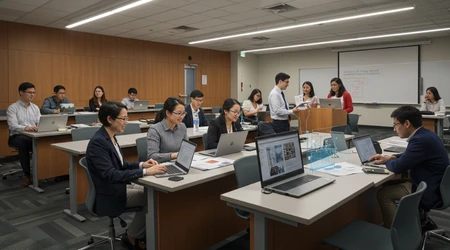University of Toronto–Harvard Cross‑Border Initiative Supports Graduate Students

The University of Toronto–Harvard Cross-Border Initiative stands as a beacon of academic resilience.
In 2025, with global education facing unprecedented challenges, this partnership between two academic titans Harvard University and the University of Toronto offers a lifeline for international graduate students.
Announced in June 2025, the initiative addresses visa uncertainties threatening students at Harvard’s John F. Kennedy School of Government (HKS).
By enabling select students to study at the University of Toronto’s Munk School of Global Affairs and Public Policy, it ensures academic continuity.
This collaboration is not just a contingency plan; it’s a bold statement about the power of cross-border cooperation in safeguarding education amid geopolitical turbulence.
Why should the global academic community take note? This initiative redefines how institutions can adapt to crises, blending innovation with compassion to protect students’ futures.
This article explores the initiative’s origins, mechanics, impact, and broader implications. It delves into how this partnership navigates visa restrictions, fosters academic excellence, and sets a precedent for global education.
Through real-world examples, a key statistic, and a vivid analogy, we’ll uncover why this program matters and what it means for the future of graduate education.
The Genesis of a Groundbreaking Partnership
The University of Toronto–Harvard Cross-Border Initiative emerged from a storm of U.S. immigration policy changes.
In May 2025, the U.S. Department of Homeland Security attempted to revoke Harvard’s Student and Exchange Visitor Program (SEVP) certification, citing alleged non-compliance with reporting requirements.
A federal judge blocked this move, but the uncertainty rattled international students, who make up 59% of HKS’s student body. Harvard and U of T responded swiftly, crafting a plan to ensure students could continue their studies.
++ Canada Adds 119 New Eligible Programs to PGWP List as of June 2025
This wasn’t a knee-jerk reaction but a strategic collaboration. The Munk School, known for its global affairs expertise, became the perfect partner.
The initiative allows returning HKS students to study in Toronto as non-degree special students, blending online and in-person courses.
The backdrop of this partnership is a tense U.S. political climate. The Trump administration’s scrutiny of Harvard, including cuts to federal research funding, heightened fears among international students. This initiative is a proactive shield against such disruptions.

How the Initiative Works in Practice
The University of Toronto–Harvard Cross-Border Initiative is a masterclass in adaptability. Eligible students those who’ve completed one year at HKS can enroll at the Munk School if U.S. visa issues arise.
They’ll take courses taught by faculty from both institutions, ensuring a seamless academic experience. Upon completion, students graduate with an HKS master’s degree.
For example, consider Aisha, a Nigerian HKS student facing visa delays. She applies for a Canadian study permit and joins the Munk School, attending classes in Toronto while staying on track for her Harvard degree.
Also read: New Indigenous Land Stewardship Degrees: Preparing 2025 Graduates for Climate Action
Another student, Carlos from Brazil, opts for HKS Global, a blended online program with in-person sessions abroad, showcasing the initiative’s flexibility.
The program requires approval from the New England Commission of Higher Education, and students must secure Canadian study permits by mid-July. This tight timeline underscores the urgency of the initiative’s rollout.
| Key Details of the Initiative | Description |
|---|---|
| Eligibility | HKS students with at least one year at Harvard |
| Location | Munk School, University of Toronto, or HKS Global online |
| Degree Awarded | Harvard Kennedy School master’s degree |
| Faculty | Joint instruction from HKS and Munk School faculty |
| Study Permit Deadline | Mid-July 2025 for Canadian study permits |
| Program Activation | Contingent on sufficient student demand |
Impact on Students and Institutions
The University of Toronto–Harvard Cross-Border Initiative is a lifeline for students like Aisha and Carlos. It ensures they aren’t derailed by geopolitical barriers.
With 59% of HKS students being international, the initiative protects a significant portion of the school’s community, fostering diversity and global perspectives.
For institutions, this partnership enhances prestige and collaboration. U of T’s Munk School gains exposure to Harvard’s rigorous curriculum, while Harvard benefits from Canada’s stable immigration policies. The initiative also sets a precedent for other universities facing similar challenges.
Read more: Curriculum for Inclusion: Saskatchewan’s Parents’ Bill of Rights and What It Means for Students
Beyond academics, it offers emotional reassurance. Students facing visa uncertainty can focus on their studies, knowing a backup plan exists. This stability is invaluable in an era of unpredictable policies.
A Model for Global Education
The University of Toronto–Harvard Cross-Border Initiative is more than a stopgap; it’s a blueprint for global education.
Imagine a ship navigating stormy seas: this partnership is the sturdy lifeboat ensuring passengers reach shore. Other universities could adopt similar cross-border models, creating networks of academic safe havens.
This initiative challenges the notion that education must be tied to a single location. By blending online and in-person learning, it embraces flexibility without sacrificing quality. It also highlights the importance of international cooperation in addressing global challenges.
As Janice Stein, Munk School’s founding director, noted, “These are exceptional times.” The initiative’s success could inspire partnerships beyond North America, reshaping how universities respond to crises.
Broader Implications for Higher Education
The University of Toronto–Harvard Cross-Border Initiative raises critical questions about the future of higher education.
It underscores the vulnerability of international students in politically charged climates. Universities must now prioritize contingency planning to protect their global communities.
This partnership also amplifies Canada’s role as an education hub. With the U.S. facing immigration uncertainties, Canada’s welcoming policies attract top talent.
In 2024, Canada hosted over 1 million international students, a number likely to grow as initiatives like this gain traction.
Finally, it challenges universities to rethink accessibility. By offering hybrid learning options, the initiative ensures education remains inclusive, setting a standard for others to follow.
Challenges and Considerations

No plan is without hurdles. The University of Toronto–Harvard Cross-Border Initiative faces logistical challenges, like securing Canadian study permits within tight timelines. The average processing time for these permits is eight weeks, testing students’ planning skills.
Another concern is program scalability. The initiative activates only with sufficient demand, which may leave some students in limbo if numbers fall short.
Additionally, integrating two distinct academic cultures requires careful coordination to maintain quality.
Despite these challenges, the initiative’s proactive approach mitigates risks. Virtual information sessions and clear communication help students navigate the process, ensuring accessibility and transparency.
Looking Ahead: A New Era for Graduate Education
The University of Toronto–Harvard Cross-Border Initiative signals a shift toward resilient, globalized education.
It empowers students to transcend borders, ensuring their academic journeys remain uninterrupted. As geopolitical tensions persist, such partnerships will become vital.
This initiative also invites reflection. Can other universities replicate this model without compromising their unique identities? The answer lies in bold collaboration and innovative thinking, qualities both Harvard and U of T exemplify.
In a world where uncertainty looms, this partnership offers hope. It’s a reminder that education, at its core, is about opening doors not closing them. By fostering resilience, the initiative paves the way for a more inclusive academic future.
Frequently Asked Questions
Who is eligible for the University of Toronto–Harvard Cross-Border Initiative?
Returning HKS students who’ve completed one year at Harvard and face U.S. visa restrictions can join the Munk School or HKS Global programs.
How do students apply for the initiative?
Students must apply for a Canadian study permit by mid-July 2025 and register as non-degree special students at the Munk School.
Will this affect U of T students’ opportunities?
No, the initiative ensures no reduction in spaces for U of T students in academic programs or housing, as confirmed by Munk School officials.
What degree do participants receive?
Participants graduate with a Harvard Kennedy School master’s degree, regardless of whether they study at the Munk School or through HKS Global.
Sources:
